January 22, 2018
The Opposite of Democracy
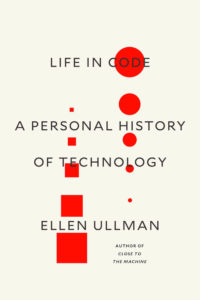 “…the ideal of the internet represents the very opposite of democracy, which is a method for resolving difference in a relatively orderly manner through the mediation of unavoidable civil associations. Yet there can be no notion of resolving differences in a world where each person is entitled to get exactly what he or she wants. Here all needs and desires are equally valid and equally powerful. I’ll get mine and you’ll get yours; there is no need for compromise and discussion. I don’t have to tolerate you and you don’t have to tolerate me. No need to care for my neighbour next door when I can stay with my chosen neighbours in the ether, my email friends and the visitors to the sites I visit, people who think as I do, who want what I want. No need for messy debate and the whole rigamarole of government with all its creaky bothersome structures. There’s no need for any of this, because now that we have the World Wide Web the problem of our pursuit of happiness has been solved! We’ll each click for our individual joys, and our only dispute may come if something doesn’t get delivered on time. Would you rather be at home?”
“…the ideal of the internet represents the very opposite of democracy, which is a method for resolving difference in a relatively orderly manner through the mediation of unavoidable civil associations. Yet there can be no notion of resolving differences in a world where each person is entitled to get exactly what he or she wants. Here all needs and desires are equally valid and equally powerful. I’ll get mine and you’ll get yours; there is no need for compromise and discussion. I don’t have to tolerate you and you don’t have to tolerate me. No need to care for my neighbour next door when I can stay with my chosen neighbours in the ether, my email friends and the visitors to the sites I visit, people who think as I do, who want what I want. No need for messy debate and the whole rigamarole of government with all its creaky bothersome structures. There’s no need for any of this, because now that we have the World Wide Web the problem of our pursuit of happiness has been solved! We’ll each click for our individual joys, and our only dispute may come if something doesn’t get delivered on time. Would you rather be at home?”
—Ellen Ullman, “The Museum of Me,” which WAS WRITTEN IN 1998 (!!), from her amazing essay collection Life in Code.
October 10, 2017
Where do my books come from?
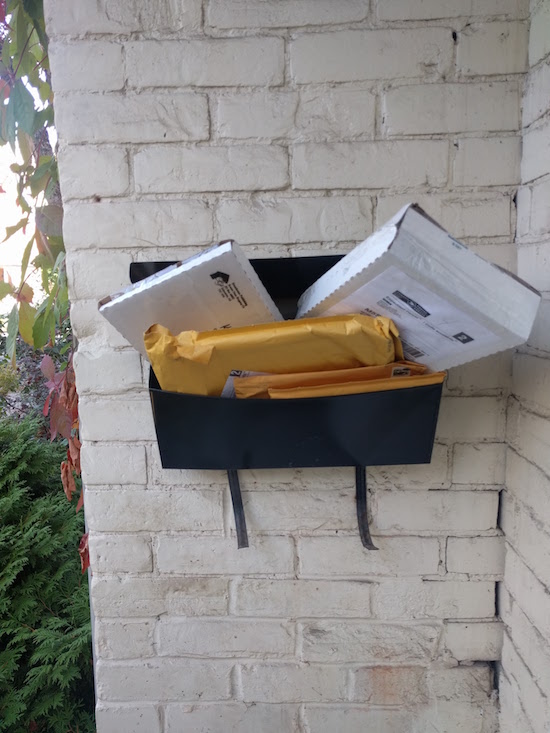
The other week I posted a photo of my mailbox on a day that was, I’ll admit it, particularly remarkable, but not unprecedented. I get a lot of books in the mail, and the photo received a lot of likes and comments that made me think about a variety of things—where my books come from, what I do with the books I receive from publishers, whether or not I persist with books I’m not enjoying, and other things. These questions are going to be the foundations of this post, and a couple of others to come, but I wanted to start with this, which is a meme I’ve done before involving listing the last books you’ve read most recently and where they came from.
- Saints and Misfits, by S.K. Ali: Received from publisher
- My Conversations with Canadians, by Lee Maracle: Purchased from Publisher’s Booth at Word on the Street
- Dazzle Patterns, by Alison Watt: Received from publisher
- What Happened, by Hillary Rodham Clinton: Purchased from Publisher’s Booth at Word on the Street
- Snacks: A Canadian Food History, by Janis Thiessen: Received from publisher
- Collected Tarts and Other Indelicacies, by Tabatha Southey: Received from publisher
- Once More With Feeling, by Meira Cook: Received from publisher
- Just Jen: Thriving Through Multiple Sclerosis, by Jen Powley: Purchased from Staff Picks shelf at Audreys Books
- If Clara, by Martha Bailey: Received from publisher
- The Mother, by Yvette Edwards: Purchased from A Different Book List
- We All Love the Beautiful Girls, by Joanne Proulx: Purchased from Hunter Street Books
- What is Going to Happen, by Karen Hoffman: Received from publisher
- A Bird on Every Tree, by Carol Bruneau: Received from publisher
- Guidebook to Relative Strangers, by Camille Dungy: Purchased from Parentbooks
- The Misfortune of Marion Palm, by Emily Culliton: Purchased from Happenstance Books and Yarns
- Glass Houses, by Louise Penny: Received from publisher (ARC)
- Today Will Be Different, by Maria Semple: Purchased from Parentbooks last year, this was a reread
- Annie Muktuk and Other Stories, by Norma Dunning: Received from publisher
- The Lesser Bohemians, by Eimear McBride: Purchased from Blue Heron Books
- Pond, by Claire Louise Bennett: Purchased from Parentbooks, this was a reread
- The Murder Stone, by Louise Penny: Found it in cottage library
- Wilde Lake, by Laura Lippman: Purchased from Happenstance Books and Yarn
- Truly, Madly, Guilty, by Lianne Moriarty: Purchased (secondhand) from Beggar’s Bouquet Books
- Scarborough, by Catherine Hernandez: Purchased from Mabel’s Fables
- History of Wolves, by Emily Fridlund: Purchased from Lighthouse Books
- Weaving Water, by Annamarie Beckel: Borrowed from the Toronto Public Library
- Do Not Become Alarmed, by Maile Meloy: Purchased from Curiosity House Books
- Turning, by Jessica J. Lee: Purchased from Curiosity House Books
- The Burning Girl, by Claire Messud: Received from Publisher
- In the Land of the Birdfishes, by Rebecca Silver Slayter: Purchased from Lexicon Books
Results are a little bit skewed because eight of these are books I read on my summer vacation and I tend to more deliberate in those choices, but still. Of the 30 books I read, 11 of them were received from publishers. They tended to be smaller publishers too because a) these are publishers I have relationships with through my work with 49thShelf.com and b) some of these books are harder to find in Ontario bookstores so I am unlikely to come across them on my own steam, at least before review copies arrive. A few are books that I would not have previously sought out of my own. Two of them I read because their publicists were quite emphatic that I, Kerry Clare addressed personally, should do so—nice work publicists; you were right. And when I do read these books publishers send me, I tend to write about them either on my blog or on 49thShelf.com, or in both places.
I tend not to read ARCs because I don’t like them—I liked to read finished books with nice covers and I like to read them when everyone else is reading them.
I also buy a lot of books and am an avid independent bookshop customer.
And finally, I don’t disclose in blog posts if I’ve received a book from a publisher. A lot of bloggers do, and on some blogs that are exclusively review sites, it makes sense. But I don’t think it does for me. I trust myself after ten years that my reviews are not biased because I’ve received a review copy—though this was a learning curve for me for sure but I got over it years ago. I get so many books in the mail, most of which I don’t even read, that the idea of treating these books differently than the books I purchase myself is kind of ridiculous—if anything, these books that find their way to me rather than me seeking them out myself actually get read much more critically, as in, “You better be worth my precious time, Book-I-didn’t-even-ask-for.” I also know that professional reviewers (of which I am one) receive review copies as standard practice and this doesn’t need to be disclosed in their reviews. And finally, I see this blog as a space for me, first and foremost, and that anybody else likes to read it is just gravy, but to pepper my posts with disclosures and the like would undermine the authenticity of what I’m up to here.
September 7, 2017
No one updates their blog enough
 No one updates their blog enough. But this is okay, because if my complaint was, “Everyone updates their blog too often,” it would tell you something about blogs and how much they matter to me—namely that they don’t. But they do, even though I have not had time to read blogs this summer. A statement that previously would have seemed ridiculous to me because one can always find some time. But this summer I spent less time than usual online, and I’m not sorry about this. But it’s wondrous to come to blogs, today while I eat my lunch, home alone, Iris’s first day of kindergarten. Feeling emotional, obviously, but blogs are such a solace, and I feel like my friends have all been here for me. And I want to share their posts with you.
No one updates their blog enough. But this is okay, because if my complaint was, “Everyone updates their blog too often,” it would tell you something about blogs and how much they matter to me—namely that they don’t. But they do, even though I have not had time to read blogs this summer. A statement that previously would have seemed ridiculous to me because one can always find some time. But this summer I spent less time than usual online, and I’m not sorry about this. But it’s wondrous to come to blogs, today while I eat my lunch, home alone, Iris’s first day of kindergarten. Feeling emotional, obviously, but blogs are such a solace, and I feel like my friends have all been here for me. And I want to share their posts with you.
- Sarah at Edge of Evening who is blogging from the beginning of August, and now I am waiting for her postcard from September, and to hear how her holiday to America was.
- A newer-to-me blog is Summer At Shores, by a woman I met at the Lakefield Literary Festival in July. I want to share her irises post, for obvious reasons, and because it’s wonderful.
- Pip Lincolne writes thoughtfully about a social media pile-on and women’s media at her blog, Meet Me At Mikes.
- I never tire of Julia Zarankin on the extraordinary ordinariness of birding at Birds and Words.
- I can’t wait to read Emily Wight’s new cookbook, Dutch Feast, which promises to make me fat, but in the meantime, there is a wonderful recipe for macaroni to tide me over.
- Rebecca Woolf on her daughter’s amazing, inspiring wildness.
- Alice Zorn on the amazing things that transpire when you publish a novel
- A new post at A Dainty Dish!! Ann Marie took my UofT blogging course a few years ago, and is one of the best people ever, and her new post is delightful and has pie.
- I promise you that Lindy Mechefske’s post is the most emotional, gorgeous recipe for making ricotta from expired milk that you’ve ever encountered in your life.
- Theresa Kishkan has a new book out, Euclid’s Orchard, and here’s a post about the difficult time in which it was created.
- Lindsay sums up a summer with swimming in her usual exuberant way.
- And Matilda Magtree DOES NOT REVIEW Dawn Dumont’s Glass Beads, which was a novel I loved entirely.
I don’t usually end my blog posts with questions, encouraging readers to engage in a more organic fashion, but I’m genuinely curious here, so I’m going to break my rule. What blogs have you been appreciating lately? Any posts you’ve written that you’re particularly proud of?
October 16, 2016
Looking for a room.

A few weeks ago, I went looking for a room. The whole thing was a bit like a dream; you know, the ones when you’re walking through a place that’s kind of your house and kind of not. Except this wasn’t at all my house. It was Emmanuel College, the building at Victoria College in which the EJ Pratt Library was temporarily located during its renovation in 2000/2001. I worked at the library throughout my undergraduate years, which included the renovation, a period during which the student workers really weren’t very busy. I used to spend hours and hours on Saturday afternoons at a desk in a room where a bunch of computer terminals had been brought in. I recall watching the sun go down at the end of day outside the west-facing window.
I wanted to find that room. The west-facing window was a clue, but I wasn’t sure about the rest of it. When I walked into Emmanuel College a few weeks ago, I was completely disoriented. Where I thought I’d find the room, I found instead a corridor, and there was a stairwell up to the second floor, but I didn’t remember it. I had to pass through the Emmanuel College Library proper (notable for being where the video for “Head Over Heels” by Tears for Fears was filmed), and I have no recollection of the library being en-route, but so it goes. And then I emerged from the library, and there it was. I think. I have no memory of a fireplace, but perhaps the fireplace was less remarkable against the computer terminals (where this creepy man used to come and look at porn and the printers still had continuous stationery).
There was a desk on the righthand side just inside the door, and that’s where I used to sit, with a computer of my own with access to the internet. Which was remarkable. In previous years, student assistants had only had access to the library catalogue and the circulation system, and I used to get a whole lot of class reading done. But less so once the World Wide Web was at my fingertips. I don’t remember what sites I used to visit, or what my online routines were at all. (The very first time I went online was in a class at high school, and my teacher told me to click on a button called “What’s Cool.”) But somehow I found my way to a livejournal belonging to a girl I’d gone to high school with, and I loved the way her livejournal was a window onto her mind, its eclecticism, its mundane details and pop song lyrics and fervent pleas, and idle records of idyl days, and posts that meant much more than that. I read it and thought, “I want to do that too.” And so one Saturday afternoon in October 2000, at my desk just inside the doorway, when I was thoroughly unoccupied and the autumn light might have been much like it was this afternoon, I signed up for an online diary of my own.
From Mitzi Bytes:
“So she started writing the words down in a diary, an online diary, which seemed particularly private since nobody else she knew spent any time on the Internet. The only people online were lonely just like she was, other people who couldn’t sleep at night. It seemed like there was just a handful of them, all networked on the online diary site. This was when she’d never heard of a ‘blog,’ let alone a blook.
She wrote about insomnia, the fish shop, the depressing corner into which she’d painted her life. She signed up for dating websites, and began to write about that too, the triumphs and the horrors of attempting to begin again. When she finally had sex with a man who wasn’t her gay ex-husband, her online friends had showered her with jubilation. This was the post that had indicated that perhaps her online diary had some resonance with the wider world. A bunch of popular blogs had linked to her post, which she’d called ‘Notes on Finally Sleeping with a Heterosexual Male,’ and the resulting traffic had crashed the server of the online diary site.”
Obviously, there is a lot I don’t have in common with the protagonist of my forthcoming novel (not least of which: I have never had sex with a ventriloquist; in my online diary years, I wasn’t having sex with anybody, which isn’t very story-worthy, and so I was unlikely to crash a server) but what we do share is the amazing connections that came from putting our ideas out into the world, ideas that were obviously intended for an audience, never meant to be as solitary as the term “online diary” suggested (…although who really intends even their analogue diary to be unread anyway. Otherwise, what is the point?).
When I started blogging (although I didn’t call it that then) I was young and impressionable, and I learned so much about the world and life and culture and experience from the people who were giving me windows into their own universes. Blogging is “a very public way of working shit out for myself,” as Emily Wight mentions in our conversation, and the “shit” I was working out and have still been working out is everything. My blog was thoroughly ridiculous back in 2000, because I was, fixated on boys whose experiences I was completely peripheral to; full of angst and longing for things I couldn’t even articulate, let alone figure out how to achieve; overwhelmed by the goodness of friends who’d stand by me all the days of my life; and swept away by the sentiment of cheesy pop lyrics, the closest thing I knew (I know?) to poetry. My blog is the path I took from there to here.
A blog needs space to grow and room to wander, exactly the way a life does. Room. A room. I’m thinking about Virginia Woolf, of course, but also that room in Emmanuel College where I created my first post, and resisted all good sense and pressed publish.
If I hadn’t been bored and a bit lonely with time on my hands, what ever would have become of me?
October 13, 2016
On Blogs and Food Blogs: a Conversation with Emily Wight
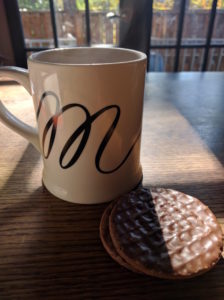 Emily Wight is author of the cookbook, Well Fed Flat Broke, which is the cookbook that taught me what people are talking about when they talk about reading cookbooks for pleasure. She is also the longtime writer behind the blog of the same name, and I really admire her work and her perspective on blogging.
Emily Wight is author of the cookbook, Well Fed Flat Broke, which is the cookbook that taught me what people are talking about when they talk about reading cookbooks for pleasure. She is also the longtime writer behind the blog of the same name, and I really admire her work and her perspective on blogging.
I’d always wondered if my own philosophy of blogging (that blogging should be easy, fit nicely into your life, never be a chore…) was relevant to food blogging. Emily was kind enough to answer my questions about food blogging, and blogging in general, and what it means to be an old school blogger still at it in 2016.
*****
Dear Emily,
I really admire your blog, your book, and all you do, and it occurs to me that you might the perfect person for something I’ve been wanting to do for a while. I teach a blogging course at UofT and think about blogging a lot, have all kinds of theories about blogs as a radical space, for women in particular. and how blogs have certainly been hijacked by commercial interest. My favourite thing about blogs is there inherent messiness, how they’re works in progress, an exercise in making it up as you go along…
But I also know that this doesn’t quite work for food blogs. A lot of work is required for a food blogger. Whereas I see a blog as a great place to practice the art of imperfection, a food blogger has to get it right or else she’ll be messing up her readers’ dinners. There is also the nature of sponsorship…
Anyway, I would be really interested in reconciling my own ideas about blogging with the realities of food blogging and expanding my understanding of blogging in general. Would you be willing to engage in a back and forth email conversation over a few days to get some of these ideas flowing?
**
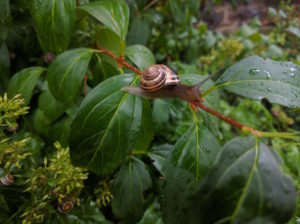 EMILY
EMILY
I’d be happy to help! But also food blogs can be messy and alive, it’s just harder to find them now. I really like Poor Man’s Feast and The Yellow House, but to be honest I’ve really moved away from reading a lot of food bloggers. By the time fall comes, I never want to see another recipe for squash soup as long as I live. I think the “why” behind food blogging has shifted from when I started one million years ago in 2007/08, certainly.
**
KERRY
Okay, so here is my first question. My whole deal is that blogging should be easy, it shouldn’t be a chore. If blogging is hard and taking up too much time, I preach, then you’re doing it wrong. But with food blogging—I suspect and as I’ve been told—there is recipe testing required, you can’t do typos (or else you can end up with a tablespoon of salt when it should have been a teaspoon). It’s a whole different game. Not to mention staging required for photographs… Has this been your experience? Is food blogging inherently hard? Is there a way to fit food blogging sustainably and easily into one’s life?
**
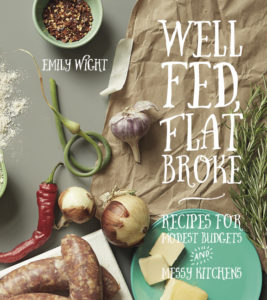 EMILY
EMILY
I don’t think food blogging is inherently hard—I have a much easier time of it than something like, say, fashion blogging, because I understand food but clothes remain a mystery to me. In most food blogging, food is the creative outlet—it’s a kind of art of its own, and so blogging about food is really just communicating a different form of expression, if that makes sense?
I think that people get satisfaction from different parts of it. I’m not a great photographer, so for me the staging and photographing is an afterthought, because no amount of effort in that regard is going to make my crappy iPhone photos significantly better; I think I’m a decent writer though, so I hope to coast on the quality of the writing and the recipes. For other people who are perhaps better photographers, maybe the writing feels hard.
In terms of accuracy and recipe development, that is a unique challenge but again I’d liken it to its own art form. Like, why would anyone do this if they weren’t either creating or archiving something? For me food blogging made sense—my education is in creative writing, but I am most excited about food, and we have to eat anyway. Food blogging became a way to write every day, or at least fairly often at a time when I might not have known what else to write about.
“Food blogging became a way to write every day, or at least fairly often at a time when I might not have known what else to write about.”
The challenge of sustainability now, I find, has less to do with the form and more to do with my own motivation. There’s a lot of “content” out there. I recognize that this is my own problem—food blogging is very different in 2016 than it was in 2008, and there are so many new voices that it can be hard to wade through and find your people. I won’t read on if I feel like a blogger is writing sponsored content, which is perhaps unfair, but again there is just so much out there now that I get to choose not to be marketed to if I don’t want that. At this stage, I am really looking for writers who make me look at food differently, or who use food as a vehicle for a larger story, whether there’s a recipe at the end or not.
**
 KERRY
KERRY
So interesting. I am also really invested in the idea of blogging as a process, and a never-ending one too. An opportunity to learn and grow. That is why I started blogging about books back in 2007ish. Which is definitely at odds with the way that most bloggers these days are urged to position themselves as experts and gurus. I feel like we don’t get to see any of the process anymore, that the process is regarded as mess, something to be swept into the corners.
Did you have any food blogger “credentials” when you started blogging back in the day? Were they even necessary? You talk about motivation for food blogging—do you think people blogging in 2016 are blogging for blogging’s sake, or are they blogging with the intention of a book deal or some other professional opportunity? And I want to know also—what motivates you to keep blogging after all this time?
**
 EMILY
EMILY
It’s totally a process! That’s why I don’t delete all my terrible, very bad posts with their clunky writing and hideous photos, because I like the idea that you can follow someone back through their process of growth. I remember when I first discovered The Bloggess in maybe 2009, and she was so funny and wonderful, and I had an evening alone (and no children), so I went all the way back through her archives and marveled at how her voice had strengthened and changed as she worked at it. There’s value in the process, and if nothing else it’s reassuring to be able to go back and see how you’ve evolved.
“I don’t delete all my terrible, very bad posts with their clunky writing and hideous photos, because I like the idea that you can follow someone back through their process of growth.”
I think the difference between then and now is really in how we’ve come to view online writing—the idea of “content” creates this sort of urgency to post regularly, to demonstrate value and expertise and keep people coming back. There has always been talk of “building an audience,” but prior to maybe 2011 the message was “make something valuable and people will come.” I don’t think that’s changed, but social media has really altered how that happens—now you don’t just have to make good blog posts, you also have to market them, and you—that was always kind of the case, but there’s so much more “content” out there now, that you have to put in a lot of effort—on a greater number of platforms—to stand out. If you want to do it well now, you have to think of yourself as a “brand” which honestly just feels so ridiculous. I get it, but I don’t want to do it.
“There has always been talk of ‘building an audience,’ but prior to maybe 2011 the message was ‘make something valuable and people will come.’ I don’t think that’s changed, but social media has really altered how that happens.”
Which is not to say that people who are doing it are doing blogging wrong, it’s just that the culture has changed. It does seem like people spring up fully formed overnight, with these beautiful sites and strong voices, but I wonder if part of that is that these are people who are approaching it with more online experience. When I started, I had had a Facebook account for maybe a year and that’s about it; I think now, for a lot of people, the social and visual aspects of blogging come pretty naturally. The technology is better—everyone has an iPhone now and iPhones take pretty good pictures. Getting to where you can be seen as an expert in whatever you’re doing is not such an investment as it used to be. “Anyone can do it” has turned into “anyone can do it well.”
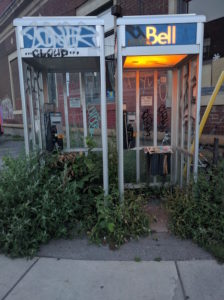 I didn’t really have much in the way of credentials when I started, short of a writing degree. But is a writing degree any less a credential than professional cooking experience, if the blog’s audience is the home cook? The people who did really well early on had really strong perspectives—people like David Lebovitz, or Luisa Weiss, or Pim Techamuanvivit (who has since quit blogging). They really created the model for what you see a lot of people doing now, and I think created a sense of what you can do if you do well online.
I didn’t really have much in the way of credentials when I started, short of a writing degree. But is a writing degree any less a credential than professional cooking experience, if the blog’s audience is the home cook? The people who did really well early on had really strong perspectives—people like David Lebovitz, or Luisa Weiss, or Pim Techamuanvivit (who has since quit blogging). They really created the model for what you see a lot of people doing now, and I think created a sense of what you can do if you do well online.
Do people blog just to blog, or do they want something else, like a book deal? I don’t know. I think people sit down and open a WordPress account for the same reason they ever did—a desire to connect, to write, or just to find their people online. But I think there is more of a sense that if this goes well, there are other opportunities in it. People take bloggers more seriously now than they did even a few years ago. You certainly see a lot of blogger cookbooks now, and they are often quite well done (and do very well).
“I think people sit down and open a WordPress account for the same reason they ever did. But I think there is more of a sense that if this goes well, there are other opportunities in it.”
As for me and why I still do it? Well, I certainly do it a lot less than I used to, because now I feel like I only want to write when I have something to say, or a recipe that’s really worth sharing, or to gauge whether what I’m working on is something people want to see more of. With other social media, like Instagram or Facebook, I still feel very connected to my community, so I spend a lot of time on there and other platforms. I treat my site as more of a portfolio—I don’t get paid to write on my blog (I don’t do ads or sponsored posts), but it generates other opportunities. It also allows me to work out my point-of-view a bit, and to figure out what I want to do. I would not have had the opportunity to write the book without the blog; now that I’ve written the book though, the blog is still very important in that it’s a place to dabble and experiment with what I want to do next. It’s a very public way of working shit out for myself. I also get the benefit of feedback—people will make the recipes or comment on the writing, so I know pretty quickly what’s working and what’s not. It’s a hard thing to let go of, especially if you came up in writing workshops and are used to a more collaborative approach to the creative process.
This ended up being a lot of words! In short, I think that blogs are valuable and the evolution and messiness is valuable and we’re in a time of transition, because at this point blogs aren’t going away and also there are always more blogs. But like anything produced en masse, there’s good, meaningful stuff in there and I want to see it, especially if it’s a bit unrefined.
**
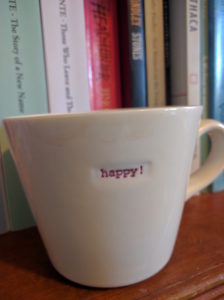 KERRY
KERRY
You are my blogging soul sister! That space to grow and evolve is so essential to successful blogging, I think (and I think a lot of bloggers who head into the gig thinking strategy and imagined outcomes are going to trip up on that). I am curious about your ideas about actually reading blogs. In my course, whenever I ask students what blogs they read, they usually shrug their shoulders and admit, “none!” Which is not to say that nobody reads blogs. I think that lots of people read blogs, but we come to them more laterally. I read food blogs all the time, but usually find them by googling whatever happens to be in my fridge and seeing what recipes result. I used to use a blog reader back in the day, but then Google ended it, and my blog reading was kind of rudderless after that—and I missed blogs. So I actively sought out a blog reader (I use protopage.com) which made reading blogs more of a regular habit. Kind of anachronistic, but I like it old school. I have a small but loyal group of readers who seem to feel just the same (and this is not JUST my mom). Anyway, I am interested in your thoughts on reading blogs and also finding readers. As you said, social media is a huge part of this.
Also, regarding the messiness: do you think it’s just too terrifying for some people to show their mess in public? Is that’s what’s driving the push toward tidy blogs? And by tidy, I mean antibacterial robot blogs? Is the blogger who’s willing to show her process taking risks that might be unwise?
**
 EMILY
EMILY
Ha! I’m glad we’re on the same page, as I often feel like I am a cranky old man about everything and no one understands 😉
Google Reader did kill blog-reading for me, in a lot of ways—remember when you could follow, like, 50 blogs? 100 blogs?! Haha, no. I don’t read a huge number of bloggers, but I have kept up with the ones who tell good stories, or who make me laugh. I love Afroculinaria, and Eating From the Ground Up, and The Pizzle, food-related blogs that offer more than just content. The thing about “content” is it’s stuff meant to fill space. How much of what we’re putting out there is valuable? How much can any one person care about? I know content when I see it, and there’s a real difference between reading something someone put thought and time into and some junk they threw up just to have a post on Tuesdays as per usual, you know? And so, I am reading fewer and fewer blogs. But the ones I am reading, I’m really invested in. Like, I would be genuinely sad if they went away. But you’re right, I don’t think people “read” blogs in the same way that they used to—I agree, I definitely come to blogs more laterally now, and I don’t often click “follow” on the blog when I find someone I like—I find them on Instagram, or on Twitter or Facebook.
I also get to say all that as someone who has been around long enough to not really have to hustle for readers. Do I need more readers? I am sure in terms of marketing books more readers would be valuable, but I am not unhappy with how I am doing, and the amount of traffic moving through the site on a daily basis, even when I don’t post very often. I recognize that the landscape is different now, and I get to be someone with cobwebs and cat hair and it’s, like, my thing. Maybe it’s not that we’re not hustling, we’ve just earned the ability to not have to? Maybe those newbies with their neat presentations and good cameras and shiny websites look at people like us, who have been around a long ass time and don’t feel obligated to bother with Pinterest, with envy?
“Maybe it’s not that we’re not hustling, we’ve just earned the ability to not have to?”
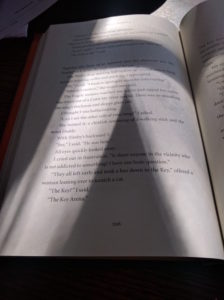 It might be scarier now to show your mess in public. Mess isn’t marketable, and I think because there are so many blogs out there now, you need to look like you know what you are doing in order to be taken seriously, or at least to be followed by people who don’t care about stuff like messiness and the creative process (which I think is most people). Another aspect of this is that a lot of these blogs are or want to be businesses—and businesses run quite a lot differently than creative projects. I want to say this in a way that doesn’t make me sound like an asshole (because I don’t mean anything offensive by it), but there’s a difference between writers and people who like to write; I think writers, or people who have always written (in the writers-as-artists sense), may value the mess and the show-of-process more than people who like to write but have other ambitions for their blogs. Writers aren’t penalized for having written shitty first drafts (or having evolved through a period of shitty-first-draftyness) because it’s expected, that’s what we do. But bloggers who want to turn blogging into something else, something beyond cookbooks or novels or whatever, maybe they approach it differently, and are more thoughtful about how they present themselves.
It might be scarier now to show your mess in public. Mess isn’t marketable, and I think because there are so many blogs out there now, you need to look like you know what you are doing in order to be taken seriously, or at least to be followed by people who don’t care about stuff like messiness and the creative process (which I think is most people). Another aspect of this is that a lot of these blogs are or want to be businesses—and businesses run quite a lot differently than creative projects. I want to say this in a way that doesn’t make me sound like an asshole (because I don’t mean anything offensive by it), but there’s a difference between writers and people who like to write; I think writers, or people who have always written (in the writers-as-artists sense), may value the mess and the show-of-process more than people who like to write but have other ambitions for their blogs. Writers aren’t penalized for having written shitty first drafts (or having evolved through a period of shitty-first-draftyness) because it’s expected, that’s what we do. But bloggers who want to turn blogging into something else, something beyond cookbooks or novels or whatever, maybe they approach it differently, and are more thoughtful about how they present themselves.
Did you see Luvvie Ajayi’s post on having been blogging ten years? She talks a bit about her process, and she had a few points I liked. This one, on evolution: “This blog has evolved with me. And my changed beliefs, my maturity and my growth as a person can be charted through the last ten years. How you start is not going to be how you continue and finish and that is okay. You are human.”
This resonated, because I think this is what’s been so great about blogging. I started out when I was 25 and still really immature in terms of my voice and my world view, and I am happy I can go back even three or four years and see that I have made progress, and that I am maybe a better version of who I was when I started. And maybe that kind of thing won’t matter to most people, but there’s a vulnerability in not being your tidiest, best-branded self and I think that resonates with the kind of readers who will stick with your writing long-term.
Follow Emily Wight on Twitter and Instagram, and stop by to read her blog.
August 29, 2016
The Art of Blogging begins again…

My very favourite part of my blogging course is week 6ish when we talk about what blogging has to do with cake, getting lost, Maira Kalman’s The Principles of Uncertainty, and hope in the darkness. If you care to take a crash course, you can do so here, but if you feel like joining us, I’m pleased to let you know that The Art of Blogging starts on October 3 and runs until the end of November at the University of Toronto’s School of Continuing Studies. You can register now, and I do hope some of you can make it.
July 28, 2016
Against Christmas in July
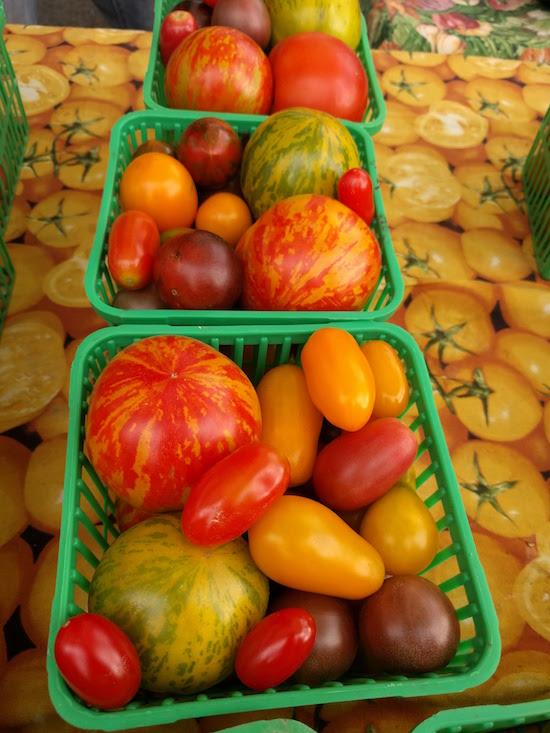
I took this photo at the farmers’ market. Yesterday.
“I think maybe I should quit trying to teach people about blogging,” I said to my husband yesterday. “I think I’m no longer qualified.” Instead of qualified, I’m become a curmudgeon, ruing change and despairing at the form. And what had brought all this on was a theme in my various social media feeds this week, bloggers being invited to attend holiday season previews for various companies and brands. In the magazine world this is certainly a thing, I understand, because magazine people are perpetually living six months in the future. But with blogs, surely with blogs, surely it would be different. The very point of blogs being their immediacy, what they tell us about life as it is being lived, about the moment. Right now.
Right now where I sit, temperatures are in the high twenties. Birds are chirping. I’m listening to cicadas buzzing. It is definitively not Christmas.
I am fully aware of the fact that I am something of a blogging luddite. I’ve made futile attempts to monetize my blog, but my heart isn’t in it. I can’t think of a way of monetizing my blog that wouldn’t compromise my practice. The point of my blog is that I like doing it, and that is reward enough for me. The point of my blog has never been to “work with brands” because I think that’s weird, but then I think a lot of things are weird that plenty of perfectly respectable reasonable people find totally normal (like shopping at Costco) so my own priorities might just be a bit skewed. But they are what they are, and the point of my blog is that they reflect this, that I write posts like this to make sense of the things in the world that flummox me, and a handful of dedicated readers continue to keep reading.
The very best thing about blogs, of course, as I tell people every time I teach a course or workshop, is that they can be anything. The elasticity of the form and capacity for evolution is why they still matter after 20 years, and so for me to declare that anybody is doing blogging wrong is totally stupid. (Especially when those bloggers probably receive far more traffic than I do, and hopefully get compensated for their labours beyond pastries consumed at industry events or shoe samples.) But I do wonder if the blogger mightn’t take heed and consider the nature of her project, what she’s getting out of it exactly, when she’s blogging about holly wreaths with the humidex in the high forties. Who is she serving exactly?
But then what do I know. I can’t even bear advance copies of new books. Summer books arriving in March, and I don’t want to read them then. Being an industry insider is all fine and well, but I want to be a reader. I want to read the books when everyone else does, to share in online enthusiasms, to write about the book while it’s fresh in my mind. For me, this is the very point of my blog, and of blogging.
Not tinsel. Not now.
Not when there’s so much to say about summer sun.
June 16, 2016
On Process, and Progress, and Living in the World

When Princess Diana died in 1997, I was on Weight Watchers and watched the funeral coverage for hours at a time whilst weeping and riding an exercise bike. I know that feeling things is very important, but will forever be grateful that I ended up married to an English person who taught me the value of composure. Remember how Joni Mitchell taught Emma Thompson in Love Actually how to feel? It was my cold hearted English husband who taught me the opposite, how not to spend weeks at a time weeping on an exercise bike over the death of a stranger. That drama comes around in time, and we don’t necessarily have to go out and court it. (While I am only being partly sardonic here, full disclosure necessitates that my husband’s is the warmest heart I know. I also know that learning to feel for many people is a ticket to sanity, but for me, some restraint was certainly in order. For most of us anyway, it ends up being a balance.)
Which doesn’t entirely relate to my next point, but alas. Which is that this has been the most distressing week I’ve encountered in a a long time, a cumulation of world events and my hormones, I’m sure, but I feel the weight of it all in a way I’m usually more adept at shouldering. Orlando, Stanford rapists, UofT’s lockdown, so much hatred and anger. Also, and this sounds shallow but it’s not, Instagram is ruined for me, changed in the last few days, and now full of ads and posts not in order, and I miss its goodness, the immediacy of the engagement. I really have found Instagram good for the soul, and feel like I’ve lost something. I’ve been driven back to Twitter, which is not good for the soul, although I actually had tears spring into my eyes this morning when I saw #OCanada trending and learned that MPs had in fact changed the lyrics to our national anthem, against the fervent efforts of many to uphold the supposed inclusiveness of the word “sons.” (Possibly yes, “sons” was a general term, back when women had no status, and the language reflected that. Further, “all our sons command” was not even the original lyric, so it’s not like historical preservation is order of the day. I taught my daughter to sing “in all of US” when she was very small, because she is a daughter and nobody’s son, and I think that if we continue to insist that things a national anthem matter, then at least we should make its lyrics meaningful.)
Anyway, when I clicked on the trending term, I found one woman declaring that she will never sing the gender inclusive Oh Canada. “Why not?” I asked her, because the resistance is baffling to me. She explained that she is “not one to bend or sway” (why is rigidity a virtue, I ask myself again and again. What kind of a person never entertains the notion of changing her mind?) when someone finds something offensive and also that the “son” in the lyric is actually Jesus, and we can’t “gender neutralize” him. And I just really didn’t know where to go from there. Her argument is founded on not only nonsense (surely we are not commanding “true patriot love” from Jesus; I’m not sure we’re meant to command anything from Jesus at all, never mind, why is Jesus in our national anthem anyway, except he’s not) but a rejected stand against empathy (refusing to try to understand when someone is bothered by something she’s okay with, to see that another point of view might be as worth considering as her own, even if it’s a different one). Anyway, it’s exhausting. She can sing her song and I’ll sing mine, but it’s worth noting that I was curious about understanding her point of view while she was categorizing the people calling for the lyric change as “wimps.” Which is pretty much where we left things.
And then I read that British MP Jo Cox had been critically injured by someone reportedly shouting slogans regarding the British referendum. And when I heard about that, it took me back to my post from Monday about politicians spouting divisive and dangerous rhetoric with so little regard about the license their words gives some unstable people in our society to go out and commit horrifying acts of violence. I also read Jia Tolentino’s interview with a woman who has recently had an abortion at 32 weeks, a really sad, hard read but an essential one, particular for those people who have no idea what the reality is behind “late term abortion.” As I tweeted afterwards, I am so grateful for these women who share their sad and terrible stories, and I am so sorry they have to and are not left alone to grieve their tragedies. That these woman must make themselves so incredibly vulnerable to prove a point to people who are completely ignorant and full of hatred. It is very easy for women like me to share our simple, painless and uncomplicated stories of abortion, and I only continue to do so because life is rarely so simple or complicated, as Tolentio’s piece makes clear. The most tremendous part of the interview is when the woman says: “Like it or not, all of our rights are intertwined. Maybe there’s some woman who has had four abortions and maybe that feels really wrong to you. But my rights are wrapped up with hers, so I have to fight like fuck for her to have as many as she wants—not just for her sake, but for mine, too.”
I hate that there are people making this, people’s pain, into a fight. We’ve all got better things to do than fight. We’ve got lives to live. And now Jo Cox has died, which is so devastating, all that it stands for, especially in terms of women in politics. I can’t stop making everything about gender, because everything is about gender.
There was a story in the news this morning about a Catholic school trustee who has finally around to the province’s new sec-ed curriculum after a revelation that her own son had been abused as a child, that perhaps it is necessary to reframe the way that sex and sexuality are discussed. While it is irritating once again to have somebody celebrated for realizing what seems blatantly obvious to many of us (see Tabatha Southey on Michael Coren), I think it’s good when a public figure is celebrated rather than denigrated for changing her mind (which is not to say that changing one’s mind puts one above scrutiny. I still think it’s rather too convenient when a politician rejects a previously controversial stance, and wonder why we’d want anybody in power who’d ever held those views).
This is, the changing of minds, is of course, the thing called progress, which is not as simple as I once thought it was—an arrow pointing forward, things getting better and better. The last fifteen years have certainly underlined that this is not the case, and that progress is not our inevitable direction. “Progressivism” isn’t even really a thing, as it is peopled by people who seems to understand themselves as its embodiment and are unaware that their own progress too has to be part of the process. It’s a process of self-examination, of being open to changing, to growing, to learning something new. It’s about bending and swaying, and learning from each other, learning how to work together. It’s collaborative, but it’s also not meaningful unless it’s intensely personal. The line that struck me from the Guardian’s Jo Cox editorial: “What nobler vision can there be than that of a society where people can be comfortable in their difference?”
I have learned so much about the world by thinking hard about blogging, and that last point makes me think about what May Friedman writes about the blogosphere(s) as a radical space “because of the implications of all these narratives coexisting, and the endless unspooling dialogue that therefore emerges.” Blogging too has taught me about how to embrace process rather than looking to an endpoint, because the complexity of the world means that progress is never fixed, that it’s not a place to arrive at. Instead it is the way that we figure out how to travel through.
May 4, 2016
No big scheme
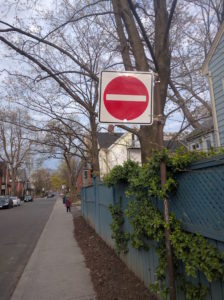 It’s interesting to me how social media has changed the way I blog. I use Twitter to share other people’s stories, whereas I used to collect these in link round-ups here, and Instagram to capture moments of domestic mundanity thereby rendering them a little less mundane (which is arguable, of course. And I still take care to keep it pretty mundane around here too). Instagram is also a good place to tell my own stories, but it takes me ages to type on my phone so I do less of this. An exception is the story of slut sign, which I shared last night, but it got a really nice response. Anyway, maybe it’s clearer to say that social media hasn’t changed the way I blog, it just has had me spreading my blogging wider, across platforms. Twitter, Instagram, Facebook—it’s blogging, all of it. (But what about Snapchat? I don’t know. A blogger can only spread herself so wide.)
It’s interesting to me how social media has changed the way I blog. I use Twitter to share other people’s stories, whereas I used to collect these in link round-ups here, and Instagram to capture moments of domestic mundanity thereby rendering them a little less mundane (which is arguable, of course. And I still take care to keep it pretty mundane around here too). Instagram is also a good place to tell my own stories, but it takes me ages to type on my phone so I do less of this. An exception is the story of slut sign, which I shared last night, but it got a really nice response. Anyway, maybe it’s clearer to say that social media hasn’t changed the way I blog, it just has had me spreading my blogging wider, across platforms. Twitter, Instagram, Facebook—it’s blogging, all of it. (But what about Snapchat? I don’t know. A blogger can only spread herself so wide.)
Which brings me to this article about the end of the blog, Bookslut, which was one of the first book blogs I read years ago when my blog wasn’t a book blog and I could only dream of such a thing, along with other bloggers like Lizzie Skurnick and Maud Newton. The interview is so candid, smart and pointed, and embodies so many of my own ideas about blogging and its inherent wildness (and messiness!) and the fact that blogs and making money were never ever compatible (and that if you’re making money with your blog, it’s probably ceased to be a blog) and that blogging in search of a book deal is a sad sad pursuit and an insult to the form.
Anyway, I already shared the article on Twitter, but I want to share it here too, along with some of my favourite bits:
- “Well, the only reason why Bookslut was interesting was because it didn’t make money, and when I realized the sacrifices I was going to have to make in order for it to make money, it wasn’t worth it.”
- ” There was no big idea, no big scheme. I just wanted to talk about books with my friends.”
- “There’s always space to do whatever you want. You won’t get as much attention, but fuck attention. Fight for integrity.”
April 18, 2016
In Praise of Messy Blogging
 I have started unfollowing all the people on Instagram whose corporeal selves are represented sole by a pair of legs. Not necessarily because it’s repetitive, because certainly they change up their knee socks and stripy tights, but because it’s just weird. How are we to know that these people are not (part of) an octopus? How much do you ever know a person when you know her only from the mid-thigh down? And what are these disembodied limbs (that are not entirely distinct from the kind you’d find at a crime scene, albeit a carefully arranged, colour-coded crime scene with impeccable lighting) telling us about the way that people are decided to construct their selves online?
I have started unfollowing all the people on Instagram whose corporeal selves are represented sole by a pair of legs. Not necessarily because it’s repetitive, because certainly they change up their knee socks and stripy tights, but because it’s just weird. How are we to know that these people are not (part of) an octopus? How much do you ever know a person when you know her only from the mid-thigh down? And what are these disembodied limbs (that are not entirely distinct from the kind you’d find at a crime scene, albeit a carefully arranged, colour-coded crime scene with impeccable lighting) telling us about the way that people are decided to construct their selves online?
I’ve been thinking about writing this blog post since reading Melanie’s Instagram post on social-media burnout a few weeks ago. She’d been contacted by someone wondering why she didn’t separate her bookish Instagram posts from ones related to her personal life, her family and her health, and become “a real bookstagrammer.” It’s advice I find so baffling as someone who’s been sharing my life online for nearly sixteen years, as well as reading about other people’s lives. Because for me, these windows into other people’s worlds has always been the most remarkable thing about web 2.0 and beyond it. In the very best book blogs, it’s not necessarily the reviews themselves that are so compelling, but what they tell us about the person who is writing them, and how the books fit into the larger narrative of the writer’s life. And I end up having a better understanding of where the writer is coming from and how their reviews work because I’ve read the posts in between (and between their lines even) and have a sense of who these people really are.
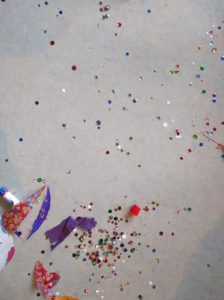 Partly this is a question of medium, of course, of platform. Superficially, old school blogs and Instagram are different, though I would argue that the latter is definitely informed by the former. And because there is no character limit on captions, Instagram has the same potential for in-depth posts which is followed up by the kind of community engagement we haven’t really seen on blogs for about a decade. But there is not the same sense of ownership of an Instagram account that one has of a blog, a “homepage,” and more of a tendency toward conformity and memes. With the immediacy of Instagram, it’s simplest to learn how it’s done by watching others. The community connections resulting from hashtags and memes are as such that Instagrammers are less inclined to operate beyond the lines of wider experience. Blogging was about being on the margins; Instagram is about being central. And of course, the platform is image-driven, and so how things look will always take priority over how things really are.
Partly this is a question of medium, of course, of platform. Superficially, old school blogs and Instagram are different, though I would argue that the latter is definitely informed by the former. And because there is no character limit on captions, Instagram has the same potential for in-depth posts which is followed up by the kind of community engagement we haven’t really seen on blogs for about a decade. But there is not the same sense of ownership of an Instagram account that one has of a blog, a “homepage,” and more of a tendency toward conformity and memes. With the immediacy of Instagram, it’s simplest to learn how it’s done by watching others. The community connections resulting from hashtags and memes are as such that Instagrammers are less inclined to operate beyond the lines of wider experience. Blogging was about being on the margins; Instagram is about being central. And of course, the platform is image-driven, and so how things look will always take priority over how things really are.
For me, a blog has always been a little bit like a selfie. (I don’t mean this in a bad way. Selfies are wonderful. Nothing tells a story like the human face, though it’s true that a little less duckface would go a long way.) This was the case even back when I started blogging, when platforms didn’t support images and no one’s phone even had a camera. The appeal of the blog has always been its human face, even with blogs as divergent as those lists of links that were essentially internet filters or those that functioned as online diaries. Whatever the material and how it was presented, a blog gave the reader a sense of the human being that was behind it. (Now whether that human being was an accurate representation of its writer is another story; I also love May Friedman’s suggestion that a person being about to construct their own online identity is not particularly a bad thing.)
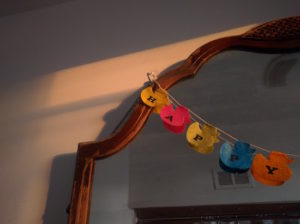 Sometimes I get the sense that Instagram is about obscuring the humanness though. Pip Lincolne has written a terrific post about virtuous intentions and true character—that one is about becoming while the other is about simply being. She posits that true character is less easily displayed through visuals and more likely to be found on Twitter or long-form blogs, while Instagram is the ideal platform for these people striving to be their best selves. Which can be kind of crazy-making. Which can have the effect of reducing a person to a pair of limbs, because everything else is too complicated.
Sometimes I get the sense that Instagram is about obscuring the humanness though. Pip Lincolne has written a terrific post about virtuous intentions and true character—that one is about becoming while the other is about simply being. She posits that true character is less easily displayed through visuals and more likely to be found on Twitter or long-form blogs, while Instagram is the ideal platform for these people striving to be their best selves. Which can be kind of crazy-making. Which can have the effect of reducing a person to a pair of limbs, because everything else is too complicated.
(I love Instagram. Have I made that clear? It enriches my life exponentially, and has connected me with amazing people, and inspires me immensely. It highlights that beauty is everywhere, even in the most curious corners. I also find it fascinating that Instagram, like blogging, is impossible to generalize about. For every pair of legs, there is a girl tight pants doing complex yoga poses on the beach or posing in the bathroom mirror showing off her fantastic outfit. I love the radicalness of Instagram accounts that give fat women or non-binary people the chance to construct their identities and be seen. And if the human face is what I’m looking for, there are many Instagram accounts that feature nothing but…though these accounts come with their own questions and complications.)
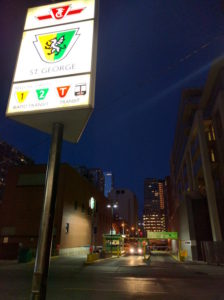 Blogging is about process. This is what I tell my students, and for many of them their biggest challenges involve overcoming notions of perfectionism and letting their unpolished selves show, using a blog post as a kind of working-though (which is what I am doing right now). But Instagram, and more visual-driven blogs, are about results. It’s about polished veneers and flawless skin tones. There’s less room for nuance, for delving into the realities of being, warts and all. Instead, there’s just a photo of a wart. And who would ever want to look at that? And now it seems I’m getting confusing because if blogging is about process, then isn’t that the “becoming” that I connected with Instagram two paragraphs back? What’s the difference between becoming and process? But I think the distinction is that with blogging, process itself is a way of being. It’s accepting life itself as a work-in-progress, and the destination is never ever the point. (Arriving at your destination, of course, would only mean that you’ve finished blogging; it would only mean that you’re dead.)
Blogging is about process. This is what I tell my students, and for many of them their biggest challenges involve overcoming notions of perfectionism and letting their unpolished selves show, using a blog post as a kind of working-though (which is what I am doing right now). But Instagram, and more visual-driven blogs, are about results. It’s about polished veneers and flawless skin tones. There’s less room for nuance, for delving into the realities of being, warts and all. Instead, there’s just a photo of a wart. And who would ever want to look at that? And now it seems I’m getting confusing because if blogging is about process, then isn’t that the “becoming” that I connected with Instagram two paragraphs back? What’s the difference between becoming and process? But I think the distinction is that with blogging, process itself is a way of being. It’s accepting life itself as a work-in-progress, and the destination is never ever the point. (Arriving at your destination, of course, would only mean that you’ve finished blogging; it would only mean that you’re dead.)
In blogging, process means showing your work and necessitates a bit of a mess. You’ve got to be a bit vulnerable, which goes against all the general advice these days about building a brand online. But the reasons for not positioning oneself as an online guru are tenfold, least among them that you’re totally lying (and if you weren’t, you’d probably have a platform that wasn’t a blog), although ultimately it’s just not sustainable. As I explain in my blogging course, if you’re writing only about those things on which you’re an expert, you’re probably limiting yourself, whereas if you’re willing to explore all you don’t know, the possibilities are infinite. It also means that if you’re making your online project an act of discovery, you’re getting something out of it beyond the (likely) pennies of ad revenue coming your way. Anyone who has ever read a novel too knows that discovery is so much more interesting to read about than somebody who knows everything already.
I also think that the pressure to know everything and be everything all the time is a lot to put on a human being, one who is doing unpaid work at that. And that allowing that human to be human is healthy and therapeutic. When a person is feeling lost and alone, there is nothing more heartening than learning there is somebody else out there who’s been there, who understands…the amazing miracle of human connection that has always been the best part of blogs anyway.
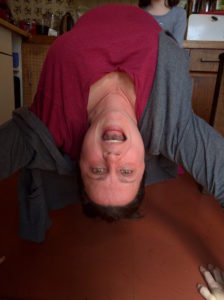 Letting humans be human then means that a person is not simply a pair of legs, or only a bookstagrammer. But rather that a person is a bookstragrammer with an actual life of which bookstagramming is simply a facet, and there are also friends and family, an interest in wildflowers and bundt cake, messy bedside bookstacks, children with dirty faces, an obsession with The Bachelor and Little House on the Prairie fan fiction—do you know what I am saying? Also, when you’re scrolling through photo after photo of impeccably arranged books on tea trays with sprigs from the garden and an artful jug against a painted wooden floor, don’t your eyes kind of glaze over?
Letting humans be human then means that a person is not simply a pair of legs, or only a bookstagrammer. But rather that a person is a bookstragrammer with an actual life of which bookstagramming is simply a facet, and there are also friends and family, an interest in wildflowers and bundt cake, messy bedside bookstacks, children with dirty faces, an obsession with The Bachelor and Little House on the Prairie fan fiction—do you know what I am saying? Also, when you’re scrolling through photo after photo of impeccably arranged books on tea trays with sprigs from the garden and an artful jug against a painted wooden floor, don’t your eyes kind of glaze over?
Hybridization is the best thing that blogs have on their side—in terms of form and technology. And I am convinced the same can be true of content, no matter who’s out there persuading others to becoming “real bookstagrammers”. And who, by the way, are the people doing that kind of persuading? I do suspect their marketers looking for the peddling of their own wares, and it’s far more simpler and salubrious to have your products marketed (without pay, no less) by people who have no human foibles and are wart-free. It also makes me sad that there are people living who’ve never known a time in which the central experiences of being online were not selling stuff and being sold stuff. In the words of Bonnie Stewart, “forget agency and voices and relationships. if you are using your network solely to sell the message of a corporate entity, what you are doing is NOT social media, no matter your platform. what you’re doing is at best a marketing job, and more likely something akin to Amway.”
I am hopeful though. I’ve been noticing a trend among Instagrammers to show their faces once in a while, with various hashtags attached to this, latching onto some kind of meme, and positing the whole thing like some kind of revelation. With these big reveals too have come some genuinely fascinating insights: one woman explained that she’s been dealing with a debilitating skin ailment for the past while and she’s been terrified to show what she really looks like. Another reviewed the new book, 13 Ways of Looking at a Fat Girl, and wrote about being fat, something she’d never dealt with in her blog before and which never been clear in her carefully positioned photos. And I can’t help but think how liberating it must have felt to finally admit these things, to own one’s imperfections, to put these things out there for everyone to see and discover that the world still likes you anyway. And for readers I am sure these posts were most remarkable too; certainly here I am still thinking about them weeks later.





